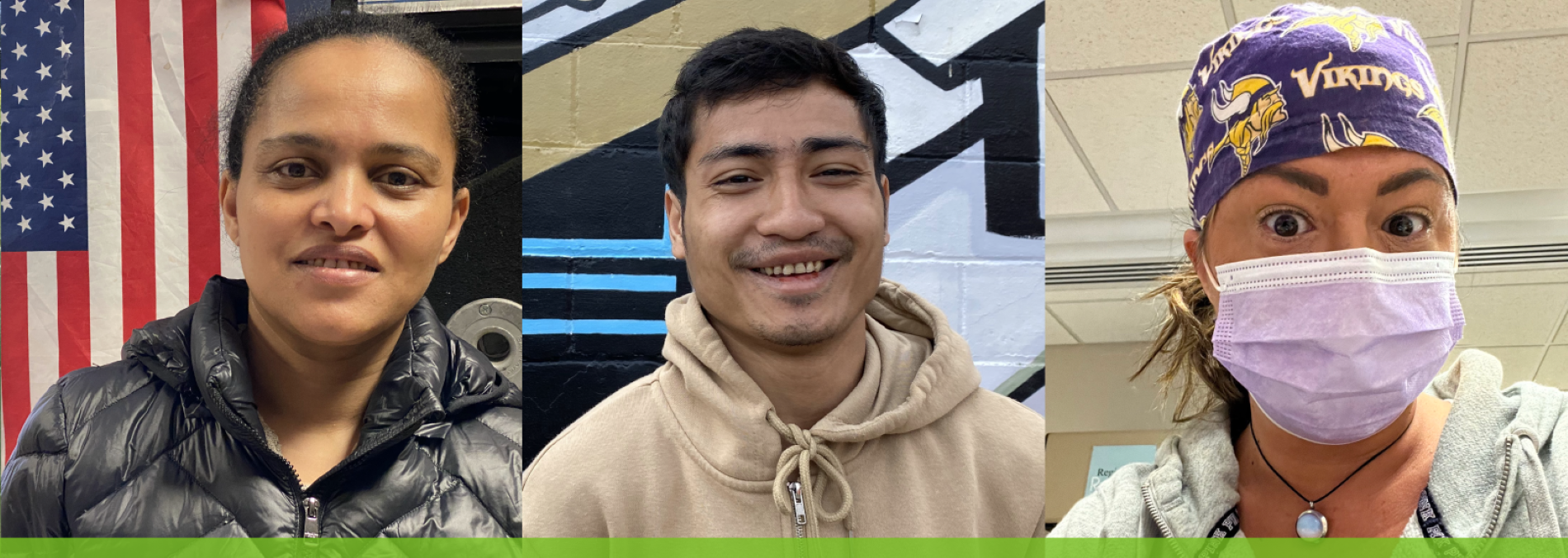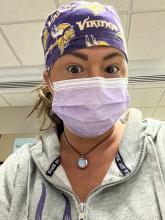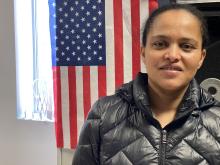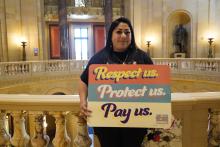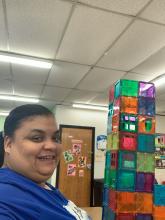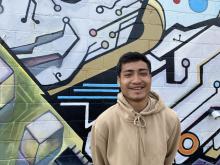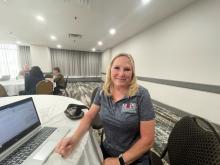Frontline worker profiles
To thank those Minnesotans who worked on the frontlines during the COVID-19 peacetime emergency, Gov. Tim Walz signed a law April 29, 2022, enabling those workers to apply for Frontline Worker Pay.
Hundreds of thousands of workers stepped up during the COVID-19 pandemic to keep our state safe and running, and the Minnesota Department of Labor and Industry wanted to profile some of these workers and recognize them for their efforts.
Brianne Bernini, emergency room technician
What is your full name, age and occupation?
Brianne Bernini, 43, emergency room technician.
How did your job duties change during the COVID-19 pandemic?
They changed a great deal. While we usually take care of the general population with everyday ailments, lacerations and broken bones, we quickly had to switch our focus to COVID-19. And, for a long time, that was really all we saw and dealt with – COVID-positive patients and, sadly, losing many to the virus.
As time has gone on, we now focus on COVID-19 and the everyday emergencies, which is resulting in longer than expected wait times, and angry and pained patients. It’s just completely changed and, I would say, created a lot more fear.
What did you think when you heard about the Frontline Worker Pay Program?
When I heard about the Frontline Worker Pay Program I thought, “Finally!” Someone is finally going to recognize our hard work, our dedication, our persistence and our love for caring for your family members. I speak for most of us when I say we want to be appreciated for what we have been through and will continue to go through for who knows how long.
Mulu Hwase, meatpacking worker
What is your full name, age and occupation?
Mulu Hwase, 48, meatpacking worker at a meatpacking facility in Worthington, Minnesota.
How did your job duties change during the COVID-19 pandemic?
When the COVID-19 pandemic started, we had to wear more protection, such as face masks and face shields. Sometimes we were missing people and we had to cover other people's jobs. I got COVID-19 along with my family members. It was very hard -- physically and emotionally. I was really worried for my kids. I locked myself in my room. When my husband knocked on the door, I told him to put something outside the door and go away. I didn't even want to tell the rest of my family, because my mom would have worried too much.
At that time, people were dying every day. I told my husband not to tell anyone unless I had to go to the hospital. I was out of work for five or six weeks, and when I finally went back, I was still not OK; I was so skinny. I don't know how I did it.
What did you think when you heard about the Frontline Worker Pay Program?
Honestly, we deserve it. At that time, things were so dark. Everyone was so scared, and still we went to work, standing right next to hundreds of other people. It was hard to protect everybody in that time. I'm proud of all of us for what we did.
Eva Lopez, custodian
What is your full name, age and occupation?
Eva Lopez, 40, janitor at a big-box retail store.
How did your job duties change during the COVID-19 pandemic?
In general, the basic functions of my job have changed due to the fear of touching any surface. At the beginning of the COVID-19 pandemic, my job included cleaning common areas often and really being on the frontline, cleaning areas to make them safer for customers. My job was no longer about doing just normal cleaning, but also cleaning areas that could be contaminated, which I continue to do.
What did you think when you heard about the Frontline Worker Pay Program?
Personally, after hearing so many stories of the difficulties that my colleagues have gone through, trying to apply for aid and being denied because they are not recognized by the government as essential workers or because the employer does not pay their medical bills and not recognizing that we are working in high-risk jobs.
Receiving this payment means government recognition of our daily efforts. I chose my job, which I perform with pride and dignity. I thank everyone who made Frontline Worker Pay possible.
Tira Marie Smith, teacher
What is your full name, age and occupation?
Tira Marie Smith, 45, preschool teacher at an early learning center.
How did your job duties change during the COVID-19 pandemic?
We had a lot more things to do. We had to clean our rooms multiple times a day, we had to clean toys between kids, we had to wear masks to protect ourselves and we had to make sure children were masked if they were coughing.
We had to space kids out to eat. We became “germ specialists.” We had to take extra classes about handling bodily fluids and protecting ourselves and the kids from germs. During that time, I got COVID-19 and was out for 10 days, using up all my sick time.
What did you think when you heard about the Frontline Worker Pay Program?
My boss told me about it and I was super excited. I asked right away, “How do you sign up?!”
Moe Thit Aung, meat cutter
What is your full name, age and occupation?
Moe Thit Aung, 24, meat cutter at a meatpacking facility in Austin, Minnesota.
How did your job duties change during the COVID-19 pandemic?
During the COVID-19 pandemic, our jobs changed a lot. A lot of people got sick from COVID and we were missing a lot of people, pretty much year-round.
We all had to do a lot of different jobs. Sometimes I would have to drive the forklifts and sometimes I would work on a completely different line. We also had fewer hours, because we couldn't keep the line running at full capacity, so I got paid less.
What did you think when you heard about the Frontline Worker Pay Program?
It's a good thing. It will help a lot of people.
Angie Halseth, corrections security caseworker
What is your full name, age and occupation?
Angie Halseth, 46, corrections security caseworker at a correctional facility in Lino Lakes.
How did your job duties change during the COVID-19 pandemic?
As caseworkers, we help people navigate their way through their incarceration time while preparing them for their transition back into the community. We act as their liaison to their families, communities, the courts and social agencies.
Some of our job duties, when it is not a pandemic, include assisting people who are incarcerated reach their goals, such as treatment completion, fill out identification documents, reunification with family and more. During the COVID-19 pandemic, a lot was added to that list. I had to do temperature checks of all the incarcerated people in the quarantine units. I also assisted in the mass testing of our population during COVID-19 outbreaks.
What did you think when you heard about the Frontline Worker Pay Program?
When I learned about Frontline Worker Pay, I felt validated for the work and sacrifice I, along with hundreds of thousands of frontline workers, endured during the COVID-19 pandemic. I am proud to have served the citizens of Minnesota, keeping our state safe and cared for during such a devastating time.
I am grateful to the coalition of unions that fought so hard to make this bonus a reality for so many deserving workers and their families in Minnesota.
Nancy Torres, social worker
What is your full name, age and occupation?
Nancy Torres, social worker.
How did your job duties change during the COVID-19 pandemic?
As a hospital social worker, I was required to be present daily and continue to provide services by working through the challenges. During the COVID-19 pandemic, we worked in fear of the unknown and were uncertain of our health risks. However, we continued to work to provide support for our coworkers and patients.
What did you think when you heard about Frontline Worker Pay Program?
The Frontline Worker Pay Program is finally providing the opportunity to recognize the individuals who remained working during the pandemic with limited resources. Frontline workers are committed and we strived to continue to push through difficult challenges to help our economic system survive. This program shows we are appreciated for our dedication.

